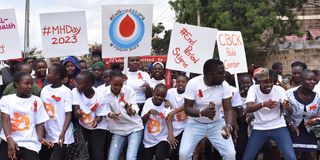Break barriers to menstrual health, hygiene

Christian Best Camps of Kenya Pad Centre staff and other participants lead a procession in Nairobi to mark the World Menstrual Hygiene Day.
May 28 is Menstrual Hygiene Day, emphasizing the need to eradicate the stigma surrounding menstruation and address period poverty. The biological process should never cause seclusion or shame for those experiencing it.
In Kenya, period poverty remains a pressing concern with many low-income women and girls struggling to access essential menstruation products such as sanitary pads, tampons, underwear and pain medication. Shockingly, girls resort to transactional sex to afford these supplies, highlighting the urgent need for action.
Research shows many Kenyan girls lack crucial knowledge about menarche and menstrual hygiene management (MHM), leading to harsh cultural practices and a limited understanding of the topic.
Encouraging open discussions at home is vital: Only half of girls openly discuss menstruation and a mere 12 per cent are comfortable talking about it with their mothers. And misconceptions persist, with one in four girls not associating menstruation with pregnancy.
Efforts towards achieving the Sustainable Development Goals (SDGs) can be strengthened by focusing on menstrual health and hygiene (MHH), owing to the strong linkages between the two.
For example, 65 per cent of women and girls cannot afford sanitary pads, leading to their limited participation in economic opportunities, hence perpetuating the cycle of poverty.
Quality education and well-being can also be achieved because knowledge of MHM and menarche helps one to identify whether there is a need for medical attention and reduces stigma.
With insufficient education about menstruation, the stigma will persist since the pre-existing myths and misconceptions about it will continue to dominate our discourse.
The significance of MHH should never be underestimated as it plays a crucial role in impacting various aspects of individuals’ lives.
Ms Nuna is a youth advocate at Naya Kenya. [email protected].





